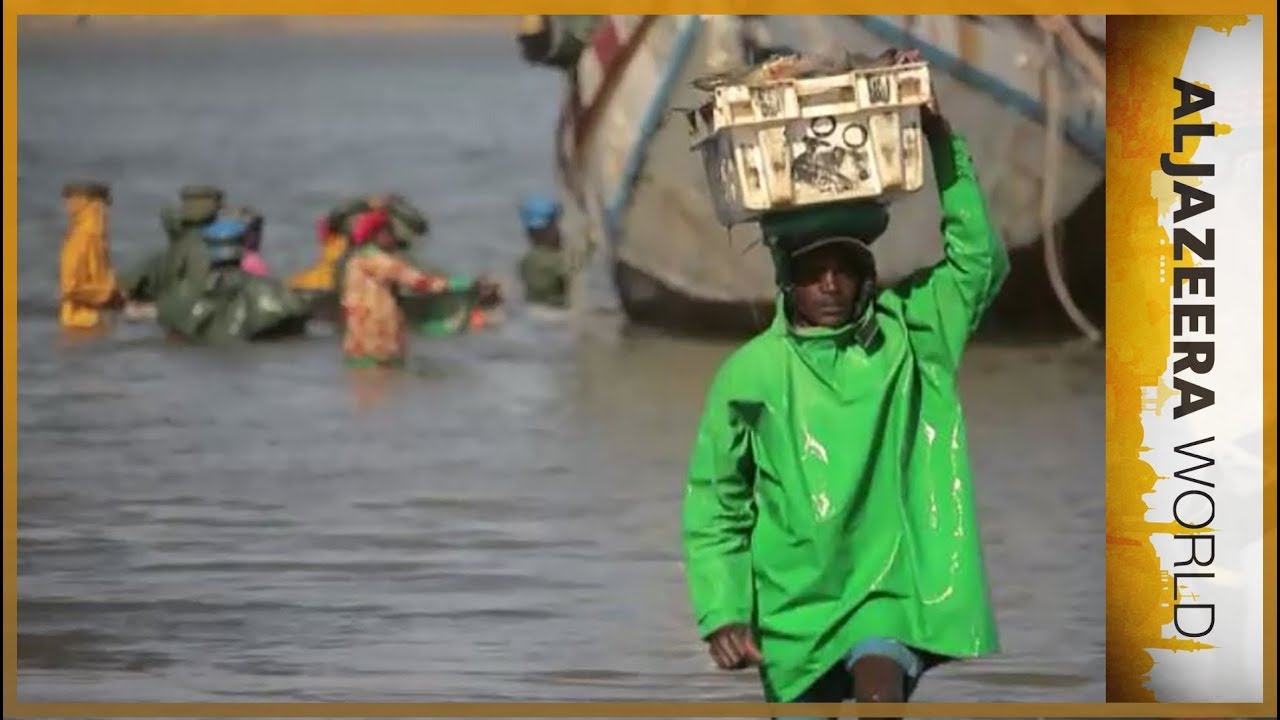🇸🇳 Senegal’s Sinking Villages | Al Jazeera World
According to the United Nations Development Programme (UNDP) 200 million people will be displaced by 2050 due to shoreline erosion, coastal flooding and agricultural disruption.
Doune Baba Dieye was once a vibrant fishing community on the Langue de Barbarie, a narrow, 30km peninsula that has protected the Senegalese port city of Saint-Louis from the Atlantic Ocean for centuries.
But changing weather patterns and heavy rainfall in 2003 led to flooding inland and a rise in sea levels that have now submerged part of the south of the peninsula. Today, the southern part of the Langue de Barbarie is an island and the village of Doune Baba Dieye under more than a metre of water.
But the impact of climate change would not have been so great had local authorities not tried to fix the problem. By 2003, as rain hit record levels, the Senegal River threatened to overflow its banks and to flood the commercially important Saint-Louis.
As floodwaters upstream slowly wound their way down the river into the Atlantic, the authorities hastily dug a four-metre-wide trench through the Langue de Barbarie. They hoped the trench would disperse the floodwaters more quickly.
We worked all day long. We fished at night and farmed during the day … We’re now homeless and unemployed.
Ahmeth Segne Diagne, Doune Baba Dieye village chief
The trench quickly widened to 800 metres, splitting the peninsula in two. What was once a four-metre-wide trench has today grown to a four-kilometre-wide channel that’s made access to the mainland more difficult for fishermen and some 120,000 Langue de Barbarie residents.
The artificial channel has also brought about an ecological disaster beyond Senegal’s coast, as salt water from the Atlantic has flooded into coastal wetlands, killing mangroves, driving away birds and affecting flora and fauna.
Letting saline Atlantic water infiltrate the Senegal River has had an impact on farmers who had long relied on the waterway to irrigate and grow their crops. Now salt levels are too high and agricultural tracts near the mouth of the Senegal River have gone fallow.
Before the waters devoured Doune Baba Dieye, village chief Ahmeth Segne Diagne had lived in balance with the earth and sea. Today, he and other former Doune Baba Dieye residents are climate refugees living primarily in temporary camps on the Senegalese mainland.
“We worked all day long,” he says. “We fished at night and farmed during the day … We’re now homeless and unemployed.”
According to a 2013 World Bank report, the sea off Langue de Barbarie was already suffering from overfishing before the breach was made in the sandbar in 2003. But the village of Gandiol has now seen its coastline progressively submerged.
Marieme Diabla had always made a living selling dry fish in the village – but now says that fishermen don’t come much to Gandiol:
“We spent our childhood between the river and the sea. There was no real distance between them. We worked in fishing and agriculture for many years when the farms were planted with vegetables,” she says. “Now it’s all gone because of the channel project. Even fishing which was once easy, is now difficult. Fishermen used to fish here. Now they use boats with engines to fish elsewhere.”
The Langue de Barbarie has become a case study on how attempts to wield and manage the forces of nature can go disastrously wrong.
In an effort to redress the disaster, Senegal has launched a series of engineering studies and hired a French construction company to build an embankment that will shield coastal homes from the ocean. After a recent visit, French President Emmanuel Macron pledged $18.6m to help protect the historic city of Saint-Louis from coastal erosion, adding to existing funds from the World Bank.
More from Al Jazeera World on:
YouTube – http://aje.io/aljazeeraworldYT
Facebook – https://www.facebook.com/AlJazeeraWorld
Twitter – https://twitter.com/AlJazeera_World
Visit our website – http://www.aljazeera.com/aljazeeraworld
Subscribe to AJE on YouTube – http://aje.io/YTsubscribe
#AlJazeeraWorld #AlJazeeraEnglish #Senegal



![Private: [ID: 9sSMjmulbSM] Youtube Automatic](https://nezha.pro/wp-content/uploads/2023/08/private-id-9ssmjmulbsm-youtube-a-236x133.jpg)
![私密內容: [ID: vOErbAXbHmo] Youtube Automatic](https://nezha.pro/wp-content/uploads/2023/08/id-voerbaxbhmo-youtube-automati-236x133.jpg)
![私密內容: [ID: 9OKAgo7yn3U] Youtube Automatic](https://nezha.pro/wp-content/uploads/2023/08/id-9okago7yn3u-youtube-automati-236x133.jpg)
![私密內容: [ID: geb2Vb2fbss] Youtube Automatic](https://nezha.pro/wp-content/uploads/2023/08/id-geb2vb2fbss-youtube-automati-236x133.jpg)
![私密內容: [ID: zSXoeqoIwL4] Youtube Automatic](https://nezha.pro/wp-content/uploads/2023/08/id-zsxoeqoiwl4-youtube-automati-236x133.jpg)
![私密內容: [ID: 9c8aHubW7w4] Youtube Automatic](https://nezha.pro/wp-content/uploads/2023/07/id-9c8ahubw7w4-youtube-automati-236x133.jpg)
![私密內容: [ID: 9W4-q3cFxSA] Youtube Automatic](https://nezha.pro/wp-content/uploads/2023/06/id-9w4-q3cfxsa-youtube-automati-236x133.jpg)
![私密內容: [ID: __dHaABgd1E] Youtube Automatic](https://nezha.pro/wp-content/uploads/2023/06/id-dhaabgd1e-youtube-automatic-236x133.jpg)
![私密內容: [ID: ALM6rESu6S4] Youtube Automatic](https://nezha.pro/wp-content/uploads/2023/06/id-alm6resu6s4-youtube-automati-236x133.jpg)
![私密內容: [ID: xJwT02swkuA] Youtube Automatic](https://nezha.pro/wp-content/uploads/2023/05/id-xjwt02swkua-youtube-automati-236x133.jpg)